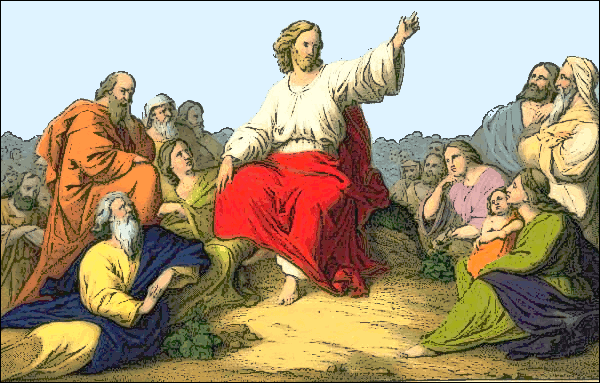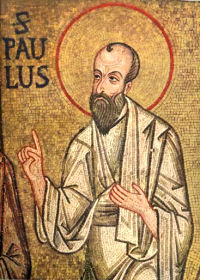"Blessed are the poor in spirit, for theirs is the kingdom of heaven."
a. The poor in spirit are those who, however great their wealth, dignity, learning, etc., acknowledge that in God's sight they are poor, and realize that their riches come from God. They are detached in heart and mind from worldly possessions, for love of God. Even in this life they are at peace, a foretaste of heaven.
b. Thus a rich man may in fact be poor in spirit, if he is not attached to his wealth, but spends it freely for good causes, and is willing to be parted from it at God's will. On the other hand a poor man is not truly poor in spirit, if he is not resigned to his poverty, but envies the rich, if he is poor against his will, or prides himself on some quality of his.
c. In general, the poor in this world's goods are also poor in spirit. They are saved from temptations into which the wealthy fall. This is one reason for seeking poverty voluntarily, according to Christ's counsel.
d. Our Lord often emphasized the difficulty of salvation when one is rich: "But woe to you rich! for you are now having your comfort" (Luke 6:24). "If thou wilt be perfect, go, sell what thou hast and give to the poor, ... and come, follow me" (Matt. 19:21). "With difficulty will a rich man enter into the kingdom of heaven" (Matt. 19:23)
e. We are, however, expected to be industrious. Pauperism which is the result of laziness is not a virtue. Beggary which can be avoided is not beneficial either to the individual or to society in general. Each one is obliged to provide for himself and for those dependent on him.
"Blessed are the meek, for they shall possess the earth."
a. The meek are those who bear patiently all the contradictions of life, looking upon them as happening through God's Will or by His permission.
b. The meek shall have peace of heart and peace of life, loved and respected by all, and at death will "possess the earth" of the living, heaven.
c. Those are also meek who, though of a naturally fiery disposition, master their anger, impatience, or desires for revenge.
d. The meek man does not get angry or curse or seek revenge. He forgives his enemies, and even wins them by gentle words. He imitates Christ, Who said: "Learn from me, for I am meek and humble of heart" (Matt. 11: 29).
"Blessed are they who mourn, for they shall be comforted."
a. Here the reference is to spiritual sorrow, grief for sin, one's own sins or the sins of others. It includes a longing amidst the sorrows of life for the joys and peace of heaven.
b. Mourning for sin is not sadness, for it is not incompatible with spiritual joy. Those who are most penitent feel most gladness upon their release from sin. But to sinners who do not mourn, these words of Our Lord should bring salutary fear: "Woe to you who laugh now, for you shall mourn and weep" (Luke 6:25).
"Blessed are they who hunger and thirst for justice, for they shall be satisfied."
a. This refers to those who ardently desire the things of God, truth and perfect virtue, as well as to those who try to become better, more humble and pure, more closely united with God.
b. Spiritual hunger and thirst is the craving for growth in holiness, a desire to be more pleasing to God, to make daily progress in doing His will. Even in this life they shall taste the joy of divine consolations; in heaven they shall enjoy the full abundance of heavenly bliss.
"Blessed are the merciful, for they shall obtain mercy."
a. The merciful are those who practice the works of mercy, corporal and spiritual, who help others not from human or natural motives simply, but from supernatural ones, from faith, from love of God.
b. To such people, Christ at the day of judgment will say: "Come, blessed of my Father, take possession of the kingdom prepared for you from the foundation of the world; for I was hungry and you gave me to eat; I was thirsty and you gave me to drink; I was a stranger, and you took me in ..." (Matt. 25:34-35).
"Blessed are the pure of heart, for they shall see God."
a. Only those who are not in habitual sin are clean of heart, and possess virtue. They will be rewarded with the vision of God in heaven; and even on earth by the great light given them.
b. There are several degrees of purity of heart: to the first degree belong those who are free from mortal sin; to the second belong those who are free from deliberate venial sin and all affection for sin; to the third degree belong those who are free from the least ill-regulated affection; to the fourth belong those who are free from the almost imperceptible stains that delay a soul's entrance into God's home; and to the last degree belong those Christians of such purity of life and thought, of such perfection of zeal and intention, that they habitually live for God alone, that they are perfectly united with Him, so that when they close their eyes in death they will fly straight into the Heart of God.
"Blessed are the peacemakers, for they shall be called children of God."
a. Men who love peace and preserve it in themselves and among others are beloved by God.
b. We should also try to reconcile those who are not on good terms with each other. This is a superior degree of the second beatitude.
"Blessed are they who suffer persecution for justice sake, for theirs is the kingdom of heaven."
a. Those are blessed who suffer for Christ, religion, or some Christian virtue. They will receive an eternal reward.
b. Those who faithfully observe the entire law of God and defend the cause of His Church, procure His glory and save souls. In this world those who are active in preserving the rights of the Church are often ridiculed and persecuted; they will be especially blessed.
Our Lord preached the Eight Beatitudes in the Sermon on the Mount. In this sermon He taught something new in the world. Where people had always striven for riches, honors, and pleasures, Christ praised the poor, the humble, the suffering.
If we practice faithfully the doctrine of the eight beatitudes, we shall find the true path of perfection and be happy besides on earth.
The Beatitudes contain in substance the law of God and all evangelical perfection.From MY CATHOLIC FAITH (Most Rev. Louis Laravoire Morrow, STD)







